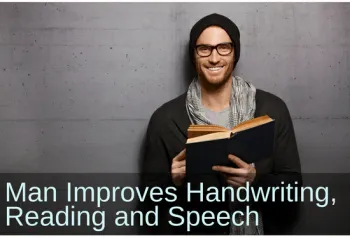Primitive Reflex Integration Case Studies
Better Concentration, Less Stuttering, and College Plans
Learning challenges disappear after rhythmic movements and reflex integration
This man in his late twenties had always struggled with handwriting and learning difficulties, barely passing school despite accommodations and tutoring. His first semester of college, he dropped out. After receiving rhythmic movements and reflex integration he could concentrate easier and his handwriting drastically improved—leading him to reconsider attending college! He also slept better, and his stuttering had reduced.
Submitted by Gloria A. Ortiz, MS, LPC intern

| Before | After |
|---|---|
| Difficulties spelling, reading, reading comprehension, completing class work, and concentrating—difficulties that caused him to drop out of college | No longer experiencing the frustration from having difficulty focusing and concentrating; considering re-enrolling in college |
| Difficulties sleeping | Better quality sleep; more relaxed |
| Stuttered | Stuttering has decreased |
Andrew is a 28-year-old male, he was 27 at the time of initiating these movements. While in school Andrew always had difficulties with completing class work on time and being able to concentrate. During grade, middle and high school Andrew was enrolled in a 504 program in order to receive accommodations. He received speech therapy while in school for stutter, as well as extra tutoring and assistance from teachers. His grades were barely passing. When enrolling in college, he had difficulty and dropped out of college during his first semester.
Andrew’s handwriting is in average state, but has difficulty spelling, reading and comprehending what he is reading. He denied having any anxiety.
I completed all reflex stimulation in order to see what areas needed integration. His challenges with handwriting, expressing ideas through writing, poor pencil grip, and difficulty with bikes made me stimulate his ATNR [Asymmetrical Tonic Neck Reflex], grasp and palmar, Babinski [reflexes] and head righting reflexes [based upon what I learned in the Brain and Sensory Foundations program].
I choose to complete the movements associated with these unintegrated reflexes because of all the difficulties Andrew had in school and throughout his life. I initiated with basic rhythmic movements for two weeks, completing them every day. The times would alternate with morning and afternoon every other day. Andrew went to work after morning movements and would complete household chores after afternoon movements.
"Within the first two weeks of movements, Andrew shared his sense of relaxation and being able to sleep better for the first two weeks."
After that, I initiated with grasp and palmar, since that was easy to add to the already established routine movements. I had Andrew write a short statement about what he was feeling before and after the hand movements.
"His handwriting changed, significantly. Even Andrew was shocked at the changes. It became easier for him to write and he even wrote longer statement after exercise. Andrew stated his hand felt lighter."
The other movements were added shortly after grasp and palmar and seemed to flow continuously and steady. Every week a “check-in” would be conducted with Andrew to check how his progress was going. Each week we noticed an increase in focus, concentration and even stuttering had decreased.
Andrew was able to help his sister with homework after 3 months of movements. Andrew no longer was experiencing the frustration from having difficulty focusing and concentrating. What I learned from working with Andrew is that it is never too late to progress on problems that seemed like would never be overcome. Andrew is even considering enrolling back into college and trying it out for a semester.
(Edited, emphasis added)
*Disclaimer: The activities in the Brain and Sensory Foundations curriculum make use of the natural processes of neuroplasticity and development that are innately wired in the design of human beings to promote maturity and function. These activities appear to calm, organize, and mature the neuro-sensory-motor systems just as we see in the healthy development of human infants. Individual results may vary, and we do not claim to offer a diagnosis or cure for any specific condition or disorder. The Brain and Sensory Foundations activities appear to improve overall functioning resulting in measurable improvements for a range of conditions as demonstrated in over 1800 case studies from participants.

